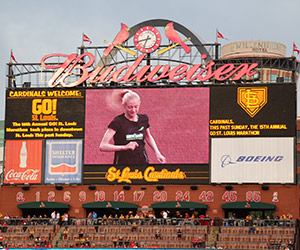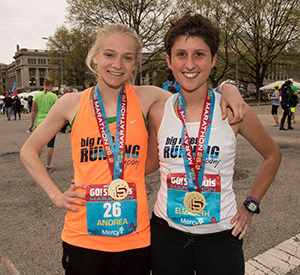Washington University in St. Louis graduate student and GO! St. Louis Marathon winner Andrea Karl said running makes her a better scientist.

“It helps immensely,” said Karl, a first-year student in the Division of Biology & Biomedical Sciences in the Graduate School of Arts & Sciences. She is working toward a PhD in molecular genetics and genomics on the School of Medicine campus.
“You can only be productive for so many hours in a row,” she said. “So when I have cells in the incubator or some time before class, I can go run for an hour and come back and be even more productive.
“I’ve actually wondered, are people going to think, ‘Wow, she’s won this marathon. She’s spending too much time running and not enough time studying,’ ” she said, “but I know I wouldn’t be as capable of a scientist if I didn’t run.”
Karl found herself thrust into the spotlight this month after judges stripped Kendall Schler of Columbia, Mo., of the winner’s title. They determined Schler had slipped onto the course late in the race not just this year, but in 2014 as well. As a result, the Boston Marathon banned Schler from participating in its race April 20.
Across the country, athletes and amateur runners alike bemoaned that Karl was denied the thrill of breaking through the winner’s ribbon and photo opps with the likes of Olympian Jackie Joyner-Kersee. But on April 19, Karl received the applause she deserved — and got to meet Joyner-Kersee — when the St. Louis Cardinals recreated the finish line behind home plate at Busch Stadium before a nationally televised game against the Cincinnati Reds.

“It’s been surreal,” Karl said the night of her Busch Stadium run. “It’s been crazy, and I feel very blessed to get to experience so many amazing things from it.”
Karl said she cared more about running a sub three-hour race than winning. Last fall, she won the St. Louis Rock ‘n’ Roll Marathon — her first — with a time of 3:01:47. Her time for the GO! St. Louis Marathon: 2:54:29. The overall winner was Richard Chelimo, who completed the 26.2-mile course in 2:36:11.
“I was just so excited to beat my time — by a lot,” Karl said. “It was such a great experience. I felt good. My family was there. To see so many friends — a lot of them from Washington University — on the course was a great experience. St. Louis has such a great running community.”
Karl doesn’t want to comment on the controversy. She doesn’t want to speculate about why Schler did what she did. Karl never doubted that she won the race, and said organizers quickly straightened out the confusion.
“They did a great job,” Karl said.
Karl is interested in DNA repair and works in the lab of Nima Mosammaparast, MD, PhD, at the School of Medicine. She said she loves being a bench scientist.
“Our cells are constantly exposed to DNA-damaging agents, both from endogenous sources and from the environment,” Karl said. “However, there are many biochemical mechanisms cells use to repair that damage. Proteins involved in these pathways are often mutated in cancer cells.
“A greater understanding of DNA repair processes will allow for the development of novel cancer treatments,” she said. “It is so exciting to be part of that research.”